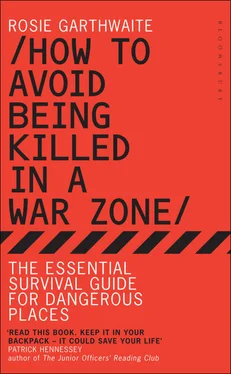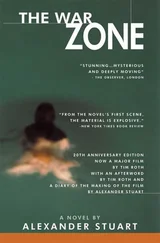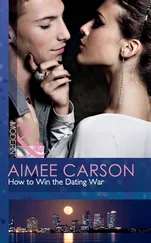Rosie Garthwaite
HOW TO AVOID BEING KILLED IN A WAR ZONE
This book is for the parents – mine and yours – and for lovers left behind.
To Mum and Dad for their sleepless nights and support for my act-first-think-later adventures.
‘How do you cope with it all? Weren’t you terrified? What’s the one thing you always pack? What do you do about food and electricity? Who or what protects you in a place like that?’ Confronted with questions like these after each assignment in a conflict zone or amidst a humanitarian crisis, journalists, diplomats and relief workers face the dilemma of glossing over the truth, or trying to tell it but failing to do it justice. The answers either take quite a bit of rehearsal, or you just admit that some things are very difficult to convey to those who haven’t experienced them.
This book gives a vivid glimpse into the experiences and thought processes of war correspondents as they try to answer these questions, but it also goes much further. It punctures a number of myths that have existed around the work of war reporters; and for me, one of the most dangerous myths is that with each experience of working in a dangerous or even just plain difficult place, you somehow build up layers of immunity until, after many such experiences, you can consider yourself (I can’t stand the phrase) ‘an old hand’. If only it were true. The list of highly experienced, dedicated and professional reporters who have been killed on assignment is every bit as tragically long as the one of young, inexperienced and dedicated journalists who go to war zones in search of a break into foreign news reporting. For war correspondents, the next assignment is always the first assignment.
Rosie’s book is a great collection of essays, reflections, memories, anecdotes and self-counselling confessionals by reporters, many of them friends and colleagues of both of us. They are at times funny and revealing, and at other times both sobering and refreshing. But above all else they are useful. It’s as though a bunch of war reporters, diplomats, travellers and aid workers have got together and collectively brewed their own extra-strength version of Schott’s Almanac .
Most importantly, Rosie’s book punctures the myth that being a war reporter means you have to be more than a mere mortal to do it, and dispels the idea that you need a bewildering array of skills to deal with a million and one situations. The truth, of course, is that people who cover conflicts and upheaval are not only human, but often find themselves unprepared for the experience. From what to pack to how to deal with checkpoints, from what to wear in the midst of a dispute between rival religious groups to the best phone to take, this book has all the facts you need, and much, much more.
It’s the kind of book that will inform, educate and entertain, and you will find yourself coming back to it again and again. Enjoy.
I do not agree with people who say that if God wanted you to die this day, you will, no matter what precautions you take. I believe God gave me a brain to do my best to avoid getting into such situations.
Imad Shihab , Iraqi journalist
Your loved oneis heading off to a war zone and you are saying goodbye. You want to give them a last piece of advice. Something that will come to them when they most need it. A moment of clarity in all that mess.
‘Don’t be a hero,’ you say. Or, ‘Remember, nothing is worth your life.’
Trite. Not very useful and trite.
I want to say, ‘Put me in your hand luggage and I’ll protect you while you get on with whatever you need to do.’ But I don’t – either fit in their hand luggage or have the ability to fight off the enemy with one hand while holding onto them with the other.
So I usually hand them my lucky bracelet, which is a string of Buddhist prayer beads from northern India, though it could be mistaken for Muslim or Catholic beads, depending on the religion of the person who taps on your car window with their gun at a checkpoint. ‘They’ve got me out of a couple of sticky situations before,’ I nod reassuringly, waving the loved one goodbye. What I don’t say is that I would be there with my pop-up emergency-room doctor and missile defence shield if I could.
But that just ain’t enough.
My friend Sherine Tadros was heading to Gaza. She’s a reporter for Al Jazeera English and had the hostile-environment training we all need in order for our insurance to work in conflict areas. But that was three years before.
‘I can’t remember how to do mouth-to-mouth, Rosie. Is it 30 breaths to two pumps?’
‘The other way round… I think.’ And she’s gone, to Jerusalem and then Gaza, before I can find anything more helpful to tell her.
Her one-night visit to Gaza turns into a four-month stint and a 23-day war. She’s deep into her first war zone, while me and my few meagre tips for survival are a time zone away.
There is a wealth of knowledge out there, but for some reason the vault of advice for people like Sherine and me was locked in other people’s memories and experience. This book aims to tap into that knowledge and bring it to a wider audience – to people who find themselves running towards bombs rather than away, to those surrounded by disaster rather than watching it on TV. This book is for doctors, charity volunteers, NGO workers, engineers, government contractors, journalists, human rights lawyers and so many more of the world’s curious and curiouser who find themselves drawn to these places.
It’s not just visitors who have to adapt. There are millions of people living in the midst of what has become routine conflict – from Bogotá to the Baltimore backstreets, from downtown Mogadishu to uptown Johannesburg, the West Bank and Beirut. They have learnt to adapt.
Over a shot of tequila you hear, ‘Of course everyone knows that’s a sure-fire way to get yourself killed.’
The nervous laughs of others echo my thoughts – ‘I didn’t.’
People who return to war zones again and again listen to a story about someone who didn’t survive, and their instincts tell them, ‘That would never have happened to me. I would never have done that.’ It’s what they tell their friends and family. A person would have to be suicidal to put themselves in a situation where they thought they might die every day. For people like them it’s a risk – but a calculated risk.
Hostile-environment courses fit you with some armour to help you make that calculation. But they are textbook while war is messy. You can never be prepared. You don’t know how you will react until it happens, and then it might be too late.
Courses are particularly bad at preparing you for the mundane issues that can be just as deadly as guns and bombs in a war zone – boredom, hunger, lack of sex, too much sex, alcohol, lack of alcohol, getting fat and unfit, adrenalin rushes with nowhere to go.
What you can do is listen to as much advice as possible from people who have spent years dodging bullets and dancing through minefields.
Here’s the disclaimer. You’ll find while reading this book that different people’s experiences can lead them to opposite conclusions. The tips are rarely what you might find in an average instruction booklet. They sometimes break rules and protocol, but they worked for the individuals in this book and they could work for you. Treat it as a guide to help you make the choices that are right for you.
Читать дальше





![Джонатан Димблби - Barbarossa - How Hitler Lost the War [calibre]](/books/385421/dzhonatan-dimblbi-barbarossa-how-hitler-lost-the-w-thumb.webp)







